The Rise of the "Mental Health Generations": How Millennials and Gen Z are Changing the Conversation around Mental Health
Millennials and Gen Z have become known as the “mental health generations” due to their increased sensitivity to mental health issues. This is largely due to increased access to mental health education through the Internet and social media, which has helped to reduce the stigma associated with seeking help.
Additionally, these generations have higher rates of mental health conditions, leading to a greater focus on mental health in popular culture and a push for more resources and support for those struggling with mental health issues. They have also popularized the concept of self-care, which includes prioritizing one’s mental health and well-being and have become known for their activism and advocacy for social justice, including increased support and resources for those struggling with mental health issues.
Mental Health Issues that Affect Millennials and Gen Z
Millennials and Gen Z are facing unique mental health issues that are impacting their well-being. Some of the most common mental health issues affecting these generations include anxiety, depression, and loneliness. These issues are often related to social media use, economic instability, and the pressure to succeed. This is especially true now with the rise of living expenses such as rent and food prices.
Additionally, these generations are also more likely to experience trauma related to events such as mass shootings and natural disasters. As a result, it is important for mental health professionals to understand these unique challenges and to develop strategies to help young adults cope with these issues and lead fulfilling lives.
Creating Better Mental Health Services for Young People
Creating better mental health services for Millennials and Gen Z is crucial in addressing the unique mental health challenges these generations face. Here are some ways we can improve mental health services for these age groups:
- Increase access to mental health resources: This can include more affordable mental health care options, online therapy resources, and mental health hotlines. Making mental health services affordable opens it to more people who require help.
- Address the stigma surrounding mental health: Millennials and Gen Zs are already more open about mental health than previous generations. We are typically more comfortable talking about therapy and mental health than older generations. But there is always room for improvement. We need to strive towards a future where there is little to no stigma around mental health. This can involve increasing public education and awareness campaigns to reduce the stigma and encourage people to seek help.
- Incorporate technology: It’s no secret that millennials and Gen Z are highly tech-savvy, so incorporating technology into mental health services can make them more accessible and appealing. This can include teletherapy, mental health apps, and online support groups. This also expands how many people can access mental health services as well. Having mental services available online opens it to people who are living in more rural areas.
- Provide culturally sensitive care: Given the diversity of these generations, it is important to provide culturally sensitive mental health services that are responsive to the unique needs of different communities. This can look like providing mental health services in a variety of languages and making mental health more culturally centred on the patient.
- Focus on prevention and early intervention: Providing resources for early intervention and prevention can help reduce the long-term impact of mental health issues, and improve outcomes for those struggling with mental health.
By implementing these strategies, we can create a mental health system that is better equipped to meet the needs of Millennials and Gen Z and support them in achieving optimal mental health and well-being.
Final Thoughts
Millennials and Gen Z are changing the conversation around mental health and reducing the stigma associated with seeking help. By increasing awareness, emphasizing self-care, and advocating for social justice, these generations are helping to create a more supportive and compassionate society for those struggling with mental health issues.
PsyMood is a digital tool designed to help you find the support you need in the language that you are most comfortable with. PsyMood considers cultural background, geographical location, interests, and personal needs, amongst other factors, to pair you with service providers for either online or in-person therapy sessions.


.png)
.png)
.png)
Recent Comments